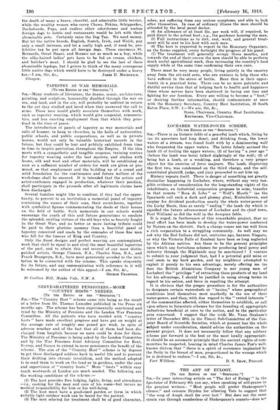LOCHABER WATER-POWER SCHEME. [TO THE EDITOR OF THE " SPECTATOR."]
SIR,—There is an historic fable of a peaceful lamb which, living by (as its ancestors had long done), and drinking from, the lower waters of a stream, was found fault with by a domineering wolf who frequented the upper waters. The latter falsely accused the lamb (1) of fouling the upper waters; (2) of having " a year ago " (before the lamb was born) talked slightingly of the wolf; (3) of being but a lamb, or a weakling, and therefore a very proper object for the exercise of force majeure. The lamb, disproving the first two, was condemned on the third charge, and the self- constituted plaintiff, judge, and jOry proceeded to eat him up.
History repeats itself. There is danger of something not greatly
dissimilar happening in Lochaber, where, without any very tan- gible evidence of consideration for the long-standing rights of the inhabitants, an industrial corporation proposes to seize, transfer to that remote " Boca di Lobo" or " Wolf's Mouth" (as the Spaniards call such a dark and gloomy glen), Kinlochleven, and employ for dividend production nearly the whole water-power of the 1.ochy Basin, thus as surely " ending " the lamb (by which is signified the future advancement of Lochaber and its chief town, Fort William) as did the wolf in the Aesopian fable.
It is urged, in furtherance of this remarkable project, that no local effort has been made to develop the water-power conferred by Nature on the district. Such a charge comes not too well from a rich corporation to a struggling community. As well may we ask why the Red Indians did not, centuries ago, harness Niagara, or why the Victoria Falls of Zambezi have been so long neglected by the African natives. Are these to be the general principles upon which any fortuitous schemes for producing local power and industry through the Highlands may be sanctioned P I venture to submit to your judgment that, had I a potential gold mine or coal seam in my back garden, and my neighbour attempted to exploit it purely to his own advantage, merely offering me (as does the British Aluminium Company to our young men of Lochaber) the " privilege " of extracting these products of my land for his advantage, I should be justified in using strong terms in regard to his action, and force in repelling the attempt.
It is obvious that the proper procedure is for the authorities to designate certain watersheds or " basins," whose geographical conditions lend themselves most markedly to the use of their water-power, and then, with due regard to the " vested interests " of the communities affected, either themselves to establish, or call upon others to formulate schemes for the founding of, appropriate industries beneficial at once to the nation, and to the particular area concerned. I suggest that the (vide Mr. Vaux Graham's letter of December 28th in the Times) Sub-Committee of the Con- joint Board of Scientific Societies, which at present has the whole subject under consideration, should advise the authorities on the present project. It does not necessarily follow that any solitary scheme put forward is the beet or the most locally appropriate. It should be an axiomatic principle that the ancient rights of com- munities be respected, bearing in mind Charles James Fox's well- known dictum that " there is a spirit of resistance implanted by the Deity in the breast of man, proportioned to the wrongs which he is destined to endure."—I am, Sir, &c., Fort William. D. S. SHAW, Provost.


























 Previous page
Previous page